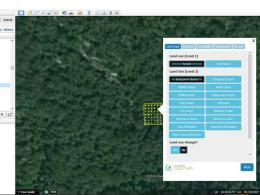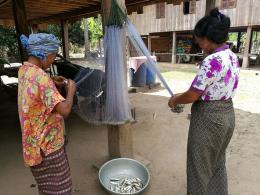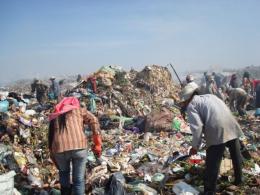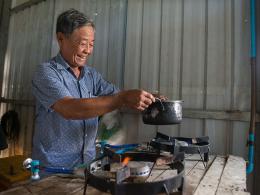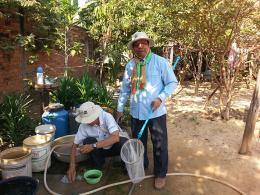Reducing the vulnerability of Cambodian rural livelihoods through enhanced sub-national climate change planning and execution of priority actions (SRL)
Reducing the vulnerability of Cambodian rural livelihoods through enhanced sub-national climate change planning and execution of priority actions (SRL)
Brief Project Description
Cambodia is one of the poorest nations in South-East Asia. Approximately 70% of Cambodian households derive all or an important part of their income from agriculture and the majority of agricultural production is dependent on the monsoon rain and natural floods/recession of the Tonle Sap River and Lake. Climate change is likely to disrupt the natural cycle of the monsoonal system and the hydrological function of the interconnected Mekong-Tonle Sap River drainage system and therefore cause a significant impact on the livelihood and welfare of rural Cambodians.
This project has been designed to reduce the vulnerability of rural Cambodians, especially land-poor, landless and/or women-headed households. This will be achieved through investments in small-scale water management infrastructure, technical assistance to resilient agricultural practices, and capacity building support, especially targeting poor women, for improved food production in home gardens. Importantly, these services will be delivered by sub-national administrations (communes, districts and provinces) with a view to strengthen their overall capacity to plan, design and deliver public services for resilience building. The objective of the project, therefore, is to improve sub-national administration systems affecting investments in rural livelihoods through climate sensitive planning, budgeting and execution. The objective will be achieved through the following three Outcomes.
Outcome 1, Climate Sensitive Planning, Budgeting and Execution at Sub-National Level Strengthened, builds on the existing system of development planning at District and Commune levels. In particular, mainstreaming of climate change adaptation in the plans and investment programmes of ten Districts and their constituent Communes will be supported. Technical capacity for climate sensitive agriculture extension and for planning and implementation of climate resilient infrastructure investments will also be developed.
Outcome 2, Resilience of Livelihoods of the most vulnerable improved against erratic rainfall, floods and droughts, will facilitate investments in small scale water management infrastructure which will contribute to resilient agricultural production, in particular by overcoming unpredictable rainfall during the wet season. Beneficiaries will be members of vulnerable communities identified through the sub-national planning process and a detailed, participatory Farmer Needs Assessment will be carried out to identify suitable improvements to resilient agricultural livelihoods. Groups of poor and vulnerable women will be assisted to develop livelihood activities requiring only limited amounts of land and will receive complementary support for social capital building activities including leadership training and formation of savings groups.
Outcome 3, Enabling environment is enhanced at sub-national level to attract and manage greater volume of climate change adaptation finance for building resilience of rural livelihoods, will result in an improved system of performance assessment for climate change adaptation by sub-national governments, linked to the Performance Based Climate Resilience Grant awards that will co-finance infrastructure investments under Outcome 2. The capacity of the sub-national administrations to monitor, evaluate and plan improvements in capacity and performance for climate change adaptation will be strengthened.
The Ministry of Environment of the Royal Government of Cambodia will be the Implementing Partner, with a number of key technical Ministries providing support which will be coordinated through a Technical Advisory Group. To ensure cross-sectoral integration, responsiveness to local needs and sustainability, sub-national activities of the Project will be integrated with the NP-SNDD under the coordination of NCDD-S. The Project will be implemented in 89 Communes and ten Districts of Siem Reap and Kampong Thom Provinces over a four year period beginning in 2015.


